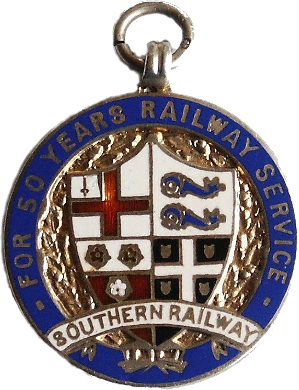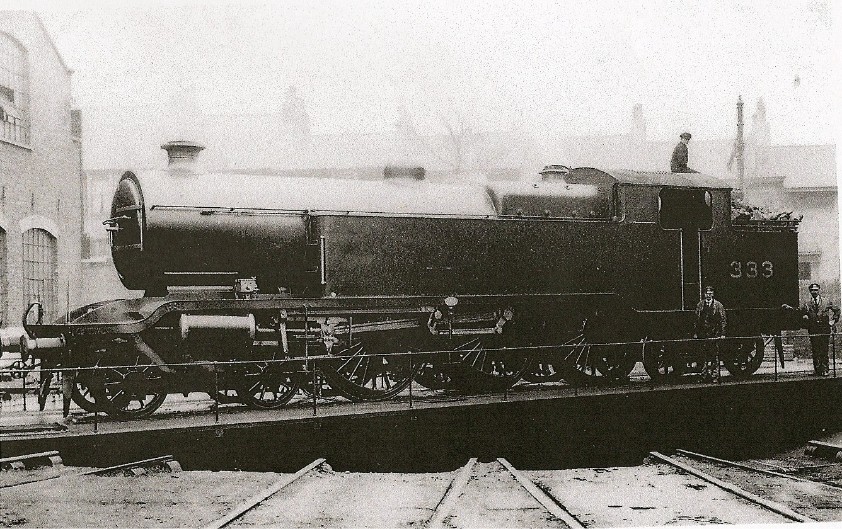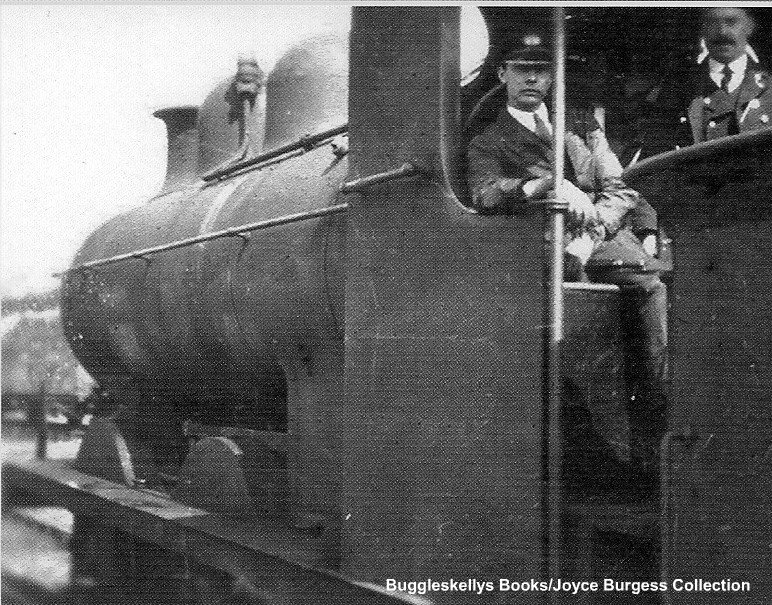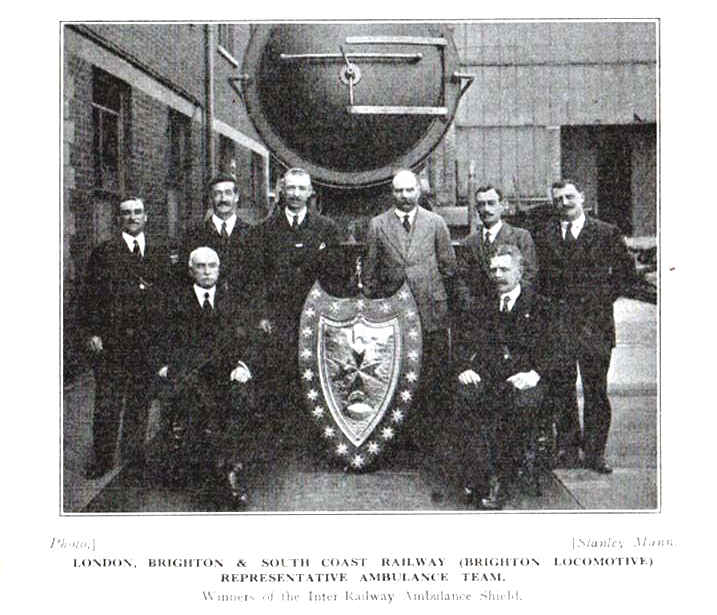
On the 1st January 1923 The Southern Railway was made up of three other railway companies.
The London and South Western Railway (L.&S.W.R.).The South Eastern and Chatham Railway (S.E.&C.R.)The South Eastern Railway and The London, Chatham and Dover Railway (L.C.&D.R.) had a working and was known as the S.E.&C.R.in 1899.
These companies together with several small independently operated railways (which included the Selsey Railway) formed the new Southern Railway.The Southern Railway also partly owned several joint lines which included the East London Line and the West London Extension Joint Railway.

At the stroke of midnight on Sunday 31st December 1922, the London Brighton & South
Coast Railway ceased to operate as an independent company and become part of the
Southern Railway. The Southern Railway incorporated two other railway companies, the
South Eastern Railway and the London & South Western Railway. The new Southern Railway operated railway lines in the Southern part of England, from Kent to Mid (North) Cornwall.
With Railway Grouping of 1923, it led to the hold up in promotions for many footplatemen at Brighton. This was due to the amalgamation having opened up a much larger catchment area for new drivers and firemen, and each new vacancy was now taken up by the most senior applicant, no matter where come from in the Southern Railway territory. As it happened there was a spate of redundancies on former London & South Western Railway. And to enginemen at Brighton, it soon began to seem as if every chance of promotion was being taken by ‘South Western’ men, who were willing to move house in order to secure or regain their appointment.
Things did not improve much, as it was not very long before the ‘Southern Electric’ system
began to spread out in the London area of the South Eastern side of the Southern Railway,
which meant the closure of steam sheds such as Slade Green and Orpington being two such
depots.
And so, at Brighton, the steady influx persisted. Men from ‘ South Western’ and a few ‘South Eastern’ men continued to take up most of the new appointments; and meanwhile, many of Brighton’s own ‘passed’ men were getting rather old for firing duties, many being in their late thirties or older. In the long run a lot of the Brighton’s own ‘passed’ men had to pull up their roots in order for them to escape from the shovel and moved elsewhere to get their promotion, with some of them never transferring back to Brighton.
An influx of 'South Western' would re-occur again during the mid 1950s.
Adapted from the book
Yesterday Once More
By Fred Rich

A.C. PERRYMAN COLLECTION
Remembrance 333 with its allocated engine drivers Fred Horsman (left) 24.06.1889) and
Harry Funnell (right).
The photo was taken on the turntable in Brighton Loco
LOCOMOTIVE JOURNAL
FEBRUARY 1923
EASTBOURNE BRANCH
May I a small space in our valuable journal, owing to a little difficulty having arisen between our members at St. Leonard’s and Eastbourne Depots re the Seniority and Promotion question. It was decided that an open meeting should take place on Sunday, December 17th. The meeting duly took place, and, to make it a greater success, our worthy Organiser, Bro Barton Wild, paid us a visit, and all members present greatly appreciated his remarks. There was a good attendance, but we should have liked to have seen a few more of our St. Leonard’s members present. The case was explained to them by our Organiser, and although no decision could take place, it is hoped that the matter will be settled at an early date. Another item that was greatly appreciated by our members was the “Modification of our Terms of Service,” explained in detail by Bro. wild. Our members fully realised the effect that the new programme would have if brought into operation, and joined unanimously with our Organiser’s remarks:- “We can afford to lose nothing.” A vote of thanks was passed to Bro. Wild for the fine address given, and the meeting broke up after nearly three hours’ discussion on various subjects. “Fight against slavery,” and “Be prepared” is the motto of
“EASTBOURNIAN"

EASTBOURNE ENGINEMEN
Hubert Hobden
Hubert started at Eastbourne on th 15th May 1913 and with electrification arrived at Eastbourne in 1935, Hubert moved to the new motorman depot at Ore in June 1935.
Extracted and adapted from
Newhaven Branch Meeting
Sunday Feb 25th 1923
Correspondence from Head office,
Circular 2nd Feb 1923, calling for organised propaganda to stimulate interest in the activity of our Society, also a warming as to the activity of the N.U.R. in connection with the Underground Electric Railways of London, and that duties in connection with the early days of the electrification of the London District of the L.B. & S.C.
Railway accident on the
Southern Railway
Brighton Section
PHOTOGRAPHER UNKNOWN
CULVER JUNCTION 5th JULY 1923
DERAILMENT AT GOLF CLUB HALT
ON 3rd SEPTEMBER 1923
Involving Selsey Driver C.C. STEWART
& his Fireman H. BARNES
On Friday 3rd September 1923 the 8.15 train from Selsey to Chichester derailed near the Golf Club Halt.The locomotive, ‘Wembley’ and all three coaches left the track. The accident resulted in the killing the fireman, H. Barnes and injuring the driver C.C. Stewart. None of the passengers were injured. At the inquest a verdict death, but the jury expressed the opinion that the Chief Engineer of the Company was indirectly to blame, as there was evidence of neglect in the up keep of the track.
LOCOMOTIVE JOURNAL
OCTOBER 1923
TUNBRIDGE WELLS BRANCH
Sunday, August 5th, is a day to be remembered by all who attended an Open Meeting for Locomotivemen held here and addressed by our General Secretary Mr. J. Bromley. There was a large number of representatives from other Branches, including Eastbourne, who, with their usual enthusiasm, organised a party of between thirty and forty, including some of their wives. There was also a good number of men from Tonbridge, Ashford, Orpington, Three Bridges, and Newhaven Branches. Bro A. Leonard, as chairman, addressed a few words of welcome to the visitors on behalf of the Tunbridge Wells Branch, and then called upon Mr. Bromley to address the meeting. Mr. Bromley, on rising, was given a very cordial reception, and said that he was very pleased to see a number of ladies present, which showed they were interested in the welfare of their men folk. Our General spoke on matters of vital importance to all Locomen, and dealt with the Railway Companies’ latest proposals on Conditions of Service for Locomotivemen, and asked the men to sink their petty differences, pointing out how essential it was to be united as one body of Locomen to withstand the demands now being made by the Companies under the influence of the Federation of British Industries. He then gave the financial position of various Railway Companies, which proved an eye opener for many present. Mr. Bromley, who spoke for about one hour and twenty minutes, was heartily applauded, and after answering a few questions to the satisfaction of those present, Councillor A. Marshall, of Eastbourne, moved a vote of thanks to Mr. Bromley for his splendid address, which had been treat to sit and listen to, and he asked those present to show their appreciation in the usual way, to which there was a hearty response.
After tea, under the auspices of Tunbridge Wells Trades Council and Labour Party, Mr. Bromley addressed an Open air Public meeting on Tunbridge Wells Common. As is usual at these meeting (which are held every Sunday during the summer months), there was a very attentive audience which showed appreciation of the speaker. Questions were asked, and satisfactorily answered, and time went all too quickly. That good results will accrue from these two meetings is the wish of the
BRANCH SECRETARY

Promotion and Seniority of Drivers, Firemen and Cleaners.
RAILWAYS STAFF CONFERENCE MINUTE NO. 35, OCTOBER 17th, 1923.
The following National arrangements with regards to promotion have been agreed between
the Railways Staff Conference and the Associated Society of Locomotive Engineers and
Firemen and the National Union of Railwaymen:-
1. The principles of the National Agreements, and of the agreed interpretations, as to
seniority and promotion to continue; and the date of entry into the line of promotion on any
railway within a group to be the date on which a man’s seniority in the service of the
Amalgamated Railway is determined.
2. Each Amalgamated Railway to be divided into a suitable number of promotion areas, and
those areas to be the basis adopted for all purposes of promotion - Cleaners to Firemen, and
Firemen to Drivers.
3. Acceptance of any promotion involving removal from one depot to another within the same promotional area to be options on the part of the man concerned.
4. No man occupying a position to which his seniority would not entitle him under this
arrangement is to be put back.
Necessary adjustments in the seniority lists to be made only in connection with future
promotions.
5. In the event of it being found necessary for men to be put back to firing or cleaners duties,
such putting back to be applied to juniors in the service in the promotional area despite the
fact that such men may have been permanently appointed in the higher grade for a longer
period than others senior to them in length of service.
* Following upon Clause 2 above, it has been agreed by Minute No.2 of the Railway Staff
Conference meeting of April 24th, 1924, that the Southern Railway shall be regarded as one
promotional area under the new scheme.
Extracted and adapted from
Newhaven Special Branch Meeting
Sunday 18th Nov 1923
Owing to the N.U.R. Propaganda among our younger members it was considered by members of the Branch committee to be desirable that the above meeting be held to review the position.
In the course of the debate Bro. Bollen informed that there must be a leakage of our Branch proceedings, for he had been told by an N.U.R. Man:- apparently with the view to elating further information:- that it was only possible for spare drivers to secure a hearing, cleaners being ignored, also that there had been an endeavour by some N.U.R. Members to create dissension among the younger members of this Branch of twisting a certain indiscretion of our late Secretary apparently, calculating, that (in addition to the alleged attitude of spare drivers) it would give some of our members:- especially the younger ones, the impression that no interest was taken in their welfare and if they would but join the N.U.R. They would be much better cared for Bro. F. Brown corroborated, being present and culminating in an attack upon the discretion of the E.C. In matters of A.S.L.E. & F & C. finance in pamphlet form. Bro. G. Bollen proposed & Bro. E. Brooker. That the Secretary endeavour to secure the pamphlet re the financial position of A.S.L.E.F. & C. known to be floating about with a view to enlightenment of members. Bro. F. Brown spoke against the distribution of pamphlets by A.S.L.E.F. & C.